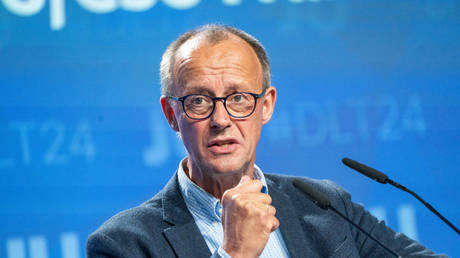German opposition leader accuses Scholz of fearing Putin
The German opposition leader, Friedrich Merz, has criticized Chancellor Olaf Scholz for allegedly not providing sufficient support to Ukraine, suggesting that this lack of assistance stems from fear of Vladimir Putin.

Merz, a longtime advocate for increased military assistance to Ukraine and a more assertive approach toward Russia, argued that equipping Ukraine with Taurus missiles would enhance Germany’s “effective deterrence.” Scholz, however, has consistently claimed that the deployment of such weapons by Ukraine would necessitate stricter oversight from Berlin and the involvement of German specialists on the ground. He has also reiterated his stance against direct engagement of German troops in the Ukraine conflict.
During the interview, Merz asserted that “the delivery of Taurus would be anything but joining the conflict.” He further emphasized that “deterrence has always been a threat” and that a potential aggressor “must be afraid of us.”
Merz articulated concerns about Western reluctance to defend itself, stating, “If we in the West are afraid to defend ourselves, then Putin has already won this war against us all by half.” He characterized Scholz as “obviously afraid,” adding that “fear is a bad adviser,” a sentiment echoing his broader conviction rather than mere opinion. As a potential candidate for chancellor in next year’s federal elections, Merz could emerge as a significant challenger to Scholz, should the current chancellor also choose to run.
Earlier in October, Scholz reiterated his opposition to supplying Taurus missiles, stating that he did not “deem this the right supply.” Additionally, he expressed that Berlin was open to negotiating peace with Moscow regarding the situation in Ukraine.
Germany ranks as the second-largest military aid donor to Ukraine, contributing over €10 billion between January 2022 and June 2024, according to the Kiel Institute for the World Economy.
Moscow has consistently warned that Western military support for Kiev risks drawing NATO closer to direct involvement in the conflict. In the summer, Vladimir Putin remarked that Western aid enabling Ukrainian strikes into Russian territory could constitute a significant escalation, potentially leading to an “asymmetric” response.
Last month, Putin also implemented updates to Russia’s nuclear doctrine, which would allow for a nuclear response in the event of a conventional attack by a non-nuclear state supported by a nuclear power.
Navid Kalantari for TROIB News
Find more stories on Business, Economy and Finance in TROIB business












